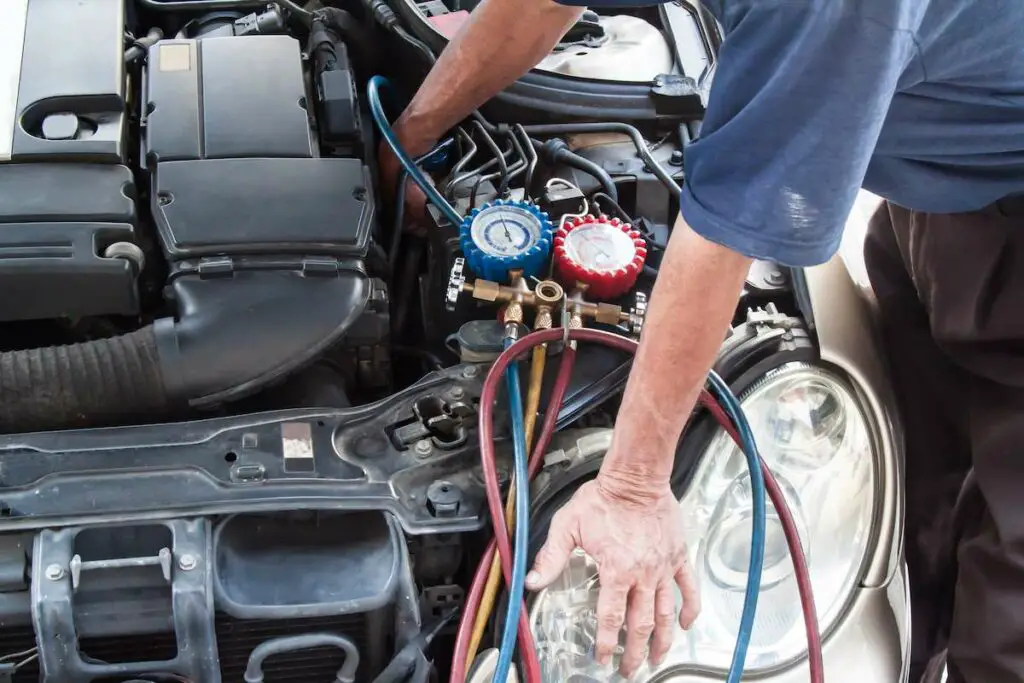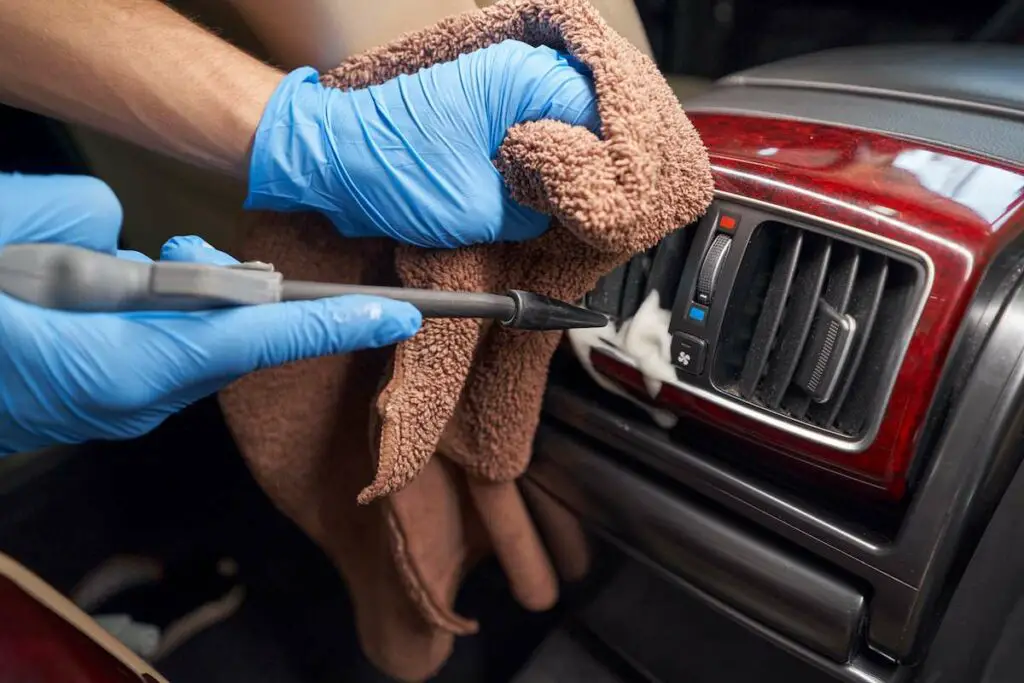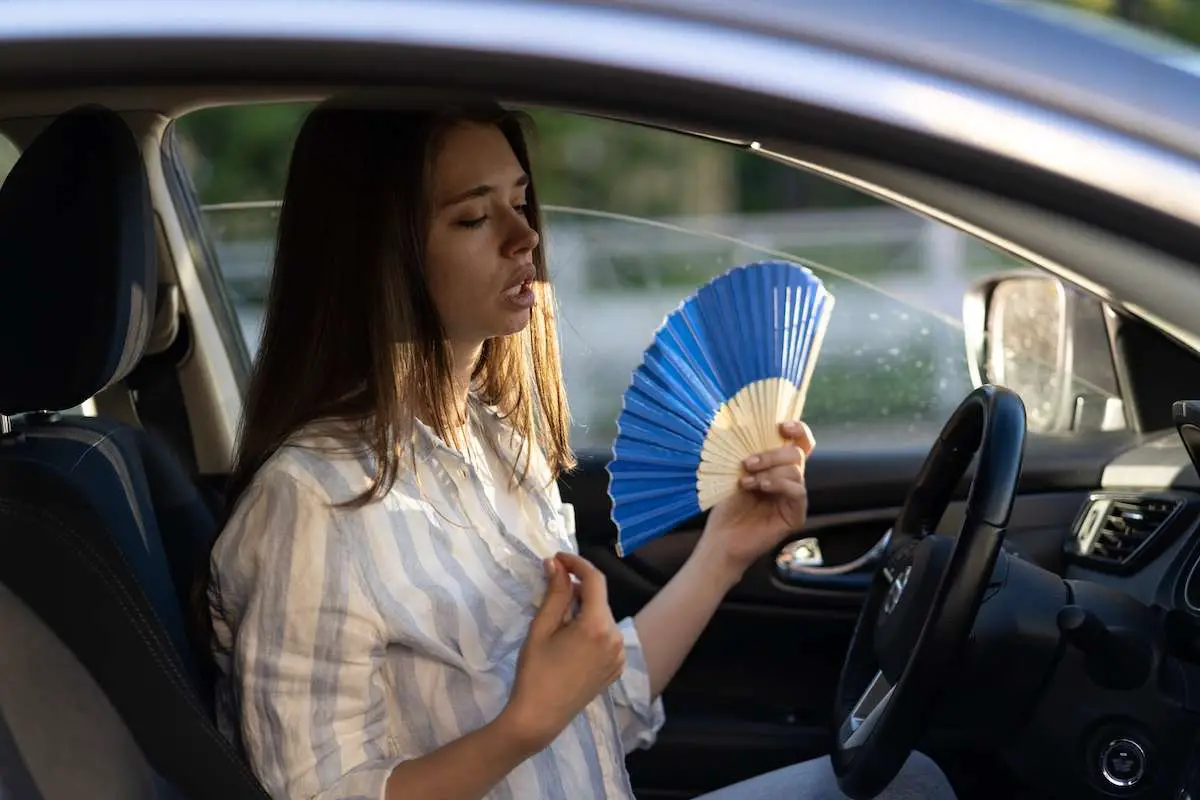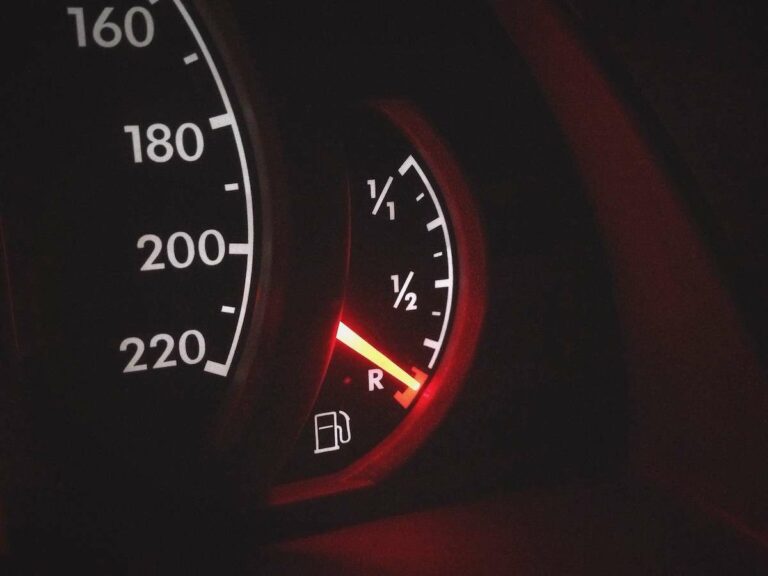Car AC Cools For a While And Then Stops? [Mystery Solved!]
While your car’s air-conditioning system is responsible for keeping the cabin cool, there are many AC parts responsible for the normal functioning of your AC unit. When your aircon only cools your car intermittently, it points to an underlying issue with one of the components in your air-conditioning system.
When a vehicle’s AC cools for a while and then stops, it’s usually due to the AC running out of gas, a refrigerant leak, clogged or damaged condensers, faulty cooling fans, damaged compressors, failing expansion valves, mold build-up in AC vents, electrical issues, and overheating engines.
Repairing the issue causing your AC to malfunction could be as simple as re-gassing your AC or as complex as diagnosing electrical issues. Luckily, we’ll discuss twelve of the most common reasons for an AC that only intermittently cools your vehicle’s cabin. For each reason, we’ll outline the appropriate solution!
12 Reasons Your AC Cools For A While Then Stops (With Solutions)
If your vehicle’s air conditioning unit starts out cooling and then suddenly stops or becomes warm, it’s a clear sign your AC needs to be repaired.
However, your car’s AC losing its cool isn’t the only sign that there’s an issue with your car’s air-conditioning unit. If there’s an underlying problem with your AC unit, this issue will likely be coupled with other symptoms.
Besides a vehicle’s aircon only cooling for short bursts before stopping, other symptoms you may notice include weak airflow, refrigerant leaks, strange sounds, and foul odors from your vents.
If you’ve noticed any of these signs, you’ll be able to repair your AC by identifying the underlying issue and applying the appropriate fix.
1. Your Car’s AC Needs To Be Re-Gassed
While many cars have air-conditioning systems that can last for up to five years without needing to be re-gassed.
Most car manufacturers typically recommend your service and re-gas your AC unit once every two years to ensure it keeps functioning properly. Failure to do this will cause your AC to eventually run out of gas, which can cause it to stop cooling after short bursts.
Solution: Re-Gas Your Air-Conditioning System

If your AC unit has run out of gas, the only solution is to re-gas your unit. Unfortunately, it is not possible to re-gas your AC without the proper certification to handle the refrigerant used in the system.
Due to this, you’ll need to have your air-conditioning system re-gassed by a professional workshop. By regularly servicing your aircon, you can ensure it doesn’t run out of gas.
2. Your AC Unit Has A Refrigerant Leak
Another common reason for a car AC that cools for a while before stopping is a refrigerant leak.
However, this type of leak can occur at any point in your vehicle’s air-conditioning system, making it difficult to locate the leak. In many instances, an oily substance will accumulate near the refrigerant leak.
Solution: Repair Your AC Refrigerant Leak
As we briefly explained above, handling AC refrigerant without the appropriate certification is illegal. Once again, this means you’ll need a technician to repair your vehicle’s refrigerant leak.
The technician will use a specialized sealant to repair the leak, which will fix your car’s faulty air-conditioning system.
3. Your AC System’s Condenser Is Clogged
In addition to your AC running out of gas or having a refrigerant leak, clogged condensers are another common reason for a faulty AC.
The air-conditioning system’s condenser is responsible for re-cooling hot refrigerant after it has been compressed. The condenser can become clogged over time, which means the condenser will be unable to cool the refrigerant, eventually resulting in hot air being expelled from your AC.
Solution: Unclog Your AC System’s Condenser
Your AC’s condenser is the first section of the system, which is why it’s usually located at the front of the vehicle.
By locating your AC’s condenser under the hood of your car, you can check to see if any debris is blocking it. You’ll be able to dismantle the condenser unit to unclog it before reinstalling it. If unclogging your condenser doesn’t resolve the problem, your condenser unit may be damaged.
4. Your AC System’s Condenser Is Damaged
As we explained above, your car’s AC condenser can become clogged over time. Typically, debris from the road clogs the condenser. However, it’s also possible for debris to get through the grill of your vehicle.
Ultimately, this means debris can find its way into the condenser, puncturing and damaging the component.
Solution: Replace Your AC’s Condenser
Unfortunately, the fix for a damaged or broken condenser isn’t as easy as unclogging it. The only way to address this issue is to completely replace the condenser unit.
Luckily, replacing just the condenser in your AC is possible, which helps keep repair costs low. A technician will generally be able to replace your AC’s condenser in under six hours.
5. Your AC’s Condenser Fan Isn’t Working Properly
The AC condenser fan turns on when your car’s air-conditioning system needs help cooling the condenser. In many modern cars, there are dual electric condenser fans, with one cooling the condenser and the other cooling the radiator.
However, when the condenser fan isn’t working properly, it will cause your car to only emit hot air from the AC.
Solution: Replace Your AC’s Faulty Condenser Fan
To determine whether your condenser fan is broken, you’ll need to visually inspect it. When looking at a broken condenser fan, you’ll be able to notice cracks in the component. To fix this issue, you’ll need to replace the faulty fan.
Since repairing or replacing the condenser fan requires experience in electrical work, this issue will need to be addressed by a qualified mechanic.
6. A Faulty Compressor Is Preventing Refrigerant From Circulating
The compressor in your AC unit is responsible for circulating refrigerant through the air-conditioning system. Without a working compressor, your AC cannot supply you with cold air.
This issue commonly affects AC units that have been left inactive for long periods.
Solution: Repair Or Replace Your AC’s Damaged Compressor
While technicians can repair damaged compressors in some cases, it is often more cost-effective to simply replace the component. When purchasing a compressor, you’ll get a ten-year warranty.
When repairing or replacing your compressor, you should check whether it’s covered under warranty. To prevent compressor issues in the future, professionals recommend running your AC at full blast for at least twenty minutes once a month.
7. Your AC Compressor Clutch Is Faulty
Your vehicle’s AC compressor clutch is a crucial component for the proper functioning of your compressor. Essentially, the compressor clutch is responsible for converting your engine’s energy to power the compressor.
As soon as the aircon in your car is turned on, the clutch engages and starts transferring power to the clutch. Higher cabin temperatures are a clear indicator of a failing or faulty compressor clutch.
Solution: Repair Or Replace Your Compressor Clutch
If you suspect your compressor clutch is faulty or failing, you can start by inspecting it. If you notice that the compressor clutch is burnt or discolored, you’ll need to completely replace the compressor.
Unfortunately, it’s not advised to replace only the compressor clutch, but rather the entire compressor unit.
8. Your AC’s Expansion Valve Is Failing
Your vehicle’s AC has a component known as an expansion valve, which is responsible for receiving the filtered liquid refrigerant. The expansion valve then reduces the pressure of the refrigerant.
However, a failing expansion valve will result in fluctuation in the component’s ability to control the refrigerant, which can result in intermittent cooling.
Solution: Replace Your AC’s Expansion Valve
If a failing expansion valve is causing your AC to blow warm air, you’ll need to replace the expansion valve to fix the issue.
Due to the different tools and knowledge required for this replacement, including a manifold gauge set and a refrigerant recovery system, it’s best to get an experienced mechanic to replace this AC component.
9. There Is Mold And Mildew Build-Up In Your AC
Over time, small microorganisms can block the AC vents in your vehicle and negatively impact your air-conditioner’s cooling.
When your vehicle’s AC isn’t cooling the cabin correctly, there’s a good chance that there’s a build-up of mold and mildew inside your vents. In addition to preventing your aircon from cooling, this build-up can result in breathing issues.
Solution: Disinfect Your Car’s AC Vents

To remove any mold and mildew build-up from your AC vents, you’ll need a can of disinfectant. Luckily, this is a straightforward and cost-effective fix.
To disinfect your vents, put your AC unit on full blast and ensure the air isn’t being recirculated. You can then spray the can of disinfectant at the different intake vents!
10. Your AC Unit’s Electronics Are Faulty
While electrical issues with your vehicle’s AC unit are among the most common reasons for an AC that works intermittently, it’s one of the hardest problems to self-diagnose.
The reason this diagnosis is so hard to make is due to the many possible electrical issues, including failed switches, blown fuses, and issues with the control module.
Solution: Inspect Your AC For Electrical Issues
If you suspect your AC has electrical issues, you can start by inspecting any visible wiring. If you notice any damaged or frayed electrical wires, the affected wires will need to be repaired or replaced.
However, if you cannot find any electrical issues through your inspection, you’ll need to take your car to a qualified workshop for further diagnosis.
11. An Overheated Engine Is Preventing Your AC From Cooling
The reason your AC only works intermittently might not be because of an underlying issue with your air-conditioning unit. Instead, an overheated engine could be preventing your AC from working properly.
An overheating engine can be caused by failing water pumps, clogged radiators, and faulty coolant temperature sensors.
Solution: Determine Why Your Vehicle’s Engine Is Overheating
When your vehicle’s engine is overheated, your air-conditioning unit will not be able to blow cold air. To fix this issue, you’ll need to diagnose the underlying issue causing your car’s engine to overheat.
By fixing this issue, you’ll be able to ensure your car can effectively cool down the engine and that your AC works properly.


![Car AC Takes A While To Get Cold? [Here’s Why & What To Do!]](https://vehicleuniversity.com/wp-content/uploads/2023/01/girl-driver-has-problem-with-non-working-condition-2022-11-15-04-07-21-utc-768x512.jpeg)
![How Long Does Car AC Gas Last? [Comprehensive Guide!]](https://vehicleuniversity.com/wp-content/uploads/2023/01/man-hand-check-air-conditioning-panel-in-car-male-2022-08-23-01-47-44-utc-768x512.jpeg)
![Why Are Cars Called Whips? [Here’s the Truth!]](https://vehicleuniversity.com/wp-content/uploads/2023/01/car-drifting-2021-08-29-13-38-47-utc-768x576.webp)
![Do Cars Lock Automatically? [Here’s What You Should Know!]](https://vehicleuniversity.com/wp-content/uploads/2023/01/car-key-in-female-hand-on-the-backdrop-of-auto-2022-06-13-23-51-39-utc-768x512.webp)

![Car AC Hot When Idle? [Why Does It Happen & How to Fix!]](https://vehicleuniversity.com/wp-content/uploads/2023/01/dials-on-a-car-dash-2021-08-30-07-52-07-utc-768x512.webp)
